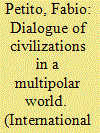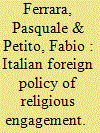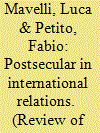|
|
|
Sort Order |
|
|
|
Items / Page
|
|
|
|
|
|
|
| Srl | Item |
| 1 |
ID:
145121


|
|
|
|
|
| Summary/Abstract |
In this article, I explore the relationship between the new multipolar trends related to the emerging powers and the idea of dialogue of civilizations. My starting point is to understand multipolarity as part of a broader epoch making process of transformation of contemporary international society beyond its Western-centric matrix. In the first part of this article, I therefore argue for an analytical understanding that emphasizes the emergence of a new multipolar world of civilizational politics and multiple modernities. In the second part of the article, I reflect on how to counter the risk inherent in the potential antagonistic logic of multipolarity by critically engaging the normative Huntingtonian construction of a multicivilizational-multipolar world order. I argue that the link between dialogue of civilizations and regionalism could represent a critical issue for the future of global peace. In particular, multiculturally constituted processes of regional integration are antidotes to the possible negative politicization of cultural differences on a global scale and can contribute to the emergence of a new cross-cultural jus gentium. These elements are critical to the construction of a realistic dialogue of civilizations in international relations while preventing the risks inherent in its growing multipolar configuration. They shape what, drawing on Amitav Acharya's work, could be named a multicivilizational-multiplex world order.
|
|
|
|
|
|
|
|
|
|
|
|
|
|
|
|
| 2 |
ID:
078264


|
|
|
|
|
| Publication |
2007.
|
| Summary/Abstract |
The global political discourse of 'dialogue among civilizations' emerged in the '90s in the context of the political debate on world order and against the background of the two competing and powerful discourses of the 'clash of civilizations' and the 'end of history'. In the post 9/11 context and after five years from the designation of the UN Year of the Dialogue among Civilizations, this political discourse has been increasingly the object of a double movement of scepticism and hope. Unfortunately very little attention has been devoted by International Relations and Political theorists to clarify and articulate its possible meaning as a normative framework for the future of international relations. Within this normative horizon, this paper shows how two statesmen-intellectuals, Mohammed Khatami, the reformist Muslim cleric then president of Iran, and Václav Havel, the 'post-modern' dissident playwright then president of the Czech Republic, have been two of the most interesting proponents of this global political discourse. Their visions, I would contend, allow us to trace more clearly the contours of dialogue among civilisations as a global political discourse as well as to begin a more in-depth theoretical articulation of dialogue of civilisation as international political theory, an academic enterprise that has been largely ignored
|
|
|
|
|
|
|
|
|
|
|
|
|
|
|
|
| 3 |
ID:
105933


|
|
|
|
|
| Publication |
2011.
|
| Summary/Abstract |
In this article I want to put forward an intellectual defence of the political discourse of dialogue of civilisations by challenging the idea that 'civilisation-based thinking' is necessarily a conflict-generating factor and arguing that, contrary to fashionable assumptions, a civilisational dialogue that wants to contribute to a more peaceful world order requires, in a qualified way, 'stronger' civilisational identities. In particular, I take issue with the academic criticisms to dialogue of civilisations coming from the camp of the critique of the clash of civilisations and well represented by Amartya Sen's explicit and Edward Said's more indirect critiques to 'civilisation-based thinking': by unveiling their implicit endorsement of the Westphalian/secularist presumption, I will show the counter-intuitive political implications of a dialogue among 'strong' civilisational identities and traditions when framed hermeneutically as 'fusion of horizons'. Finally I provide a supplementary brief illustration to my defence of dialogue of civilisations by criticising Said's reading of Louis Massignon - the great 20th century French scholar of Islam - as part of Orientalism and suggesting that 'in diverging agreement' with Said, Massignon's work and life stand as a very concrete proof of the possibility of a 'dialogue of civilisations' that escapes the yoke of the Orientalist accusations.
|
|
|
|
|
|
|
|
|
|
|
|
|
|
|
|
| 4 |
ID:
144733


|
|
|
|
|
| Summary/Abstract |
A new awareness of the role of religion in international relations has started to inform concrete policy discussions in several Western Ministries of Foreign Affairs under the heading of ‘religious engagement’ in foreign policy. Italy is no exception, but as the country which hosts the Holy See, it represents a special case. As the approach to religion found in the historical record of Italian foreign policy shows, Italy has a comparative advantage and could well develop a unique model of religious engagement by strengthening the central structures involved in religious matters and foreign policy, as well as by using the vast network of Rome-based religious non-state actors as a forum of consultation and policy advice.
|
|
|
|
|
|
|
|
|
|
|
|
|
|
|
|
| 5 |
ID:
117455


|
|
|
| 6 |
ID:
050636


|
|
|
|
|
| Publication |
New York, Palgrave Macmillan, 2003.
|
| Description |
x, 286p.
|
| Standard Number |
1403962073
|
|
|
|
|
|
|
|
|
|
|
|
Copies: C:1/I:0,R:0,Q:0
Circulation
| Accession# | Call# | Current Location | Status | Policy | Location |
| 047776 | 291.1787/HAT 047776 | Main | On Shelf | General | |
|
|
|
|
| 7 |
ID:
108907


|
|
|
|
|
| Publication |
2011.
|
| Summary/Abstract |
The revival of geopolitics in post-1989 Italy is at once a rather straightforward and perplexing matter. On the one hand, the renewed appeal that geopolitical thinking has enjoyed in International Relations (IR) circles has been well documented and could hardly be downplayed. On the other hand, however, the recourse to geopolitics has often boiled down to an undifferentiated and often convoluted use of its terms, approaches and theories. In this article we argue that the rationale of such a revival has been less to import geopolitical knowledge into IR and more to confer legitimacy and respectability to the analyses put forward by scholars and practitioners. It is no chance, in fact, that the geopolitics-inspired academic discourse has been progressively recognised as a way, if not the way, to discuss international affairs in post-1989 Italy. The central puzzle to be investigated behind the revival of geopolitics in Italy is thus how such a discourse has managed to gain and retain a powerful status in Italian IR academia and, most importantly, why.
|
|
|
|
|
|
|
|
|
|
|
|
|
|
|
|
|
|
|
|
|